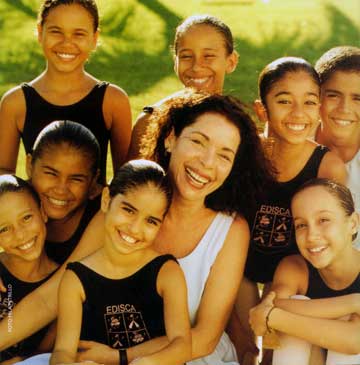Dora Andrade teaches poor kids in Fortaleza, Brazil to dance—with their bodies, and with their hearts and minds.
In many societies, including Brazil’s, formal ballet training is for the children of the middle class and the wealthy. Some Brazilians were appalled by the idea of barrio kids performing ballet in theatres, even telling Andrade that her “poor little creatures” would get nice theaters dirty or break things there. The doubters certainly weren’t interested in attending a performance.
Now, Andrade’s dancers are so renowned they play to sold-out audiences and are favorites of the nation’s press. Their prominence helps them bring national attention to the plight of the poor, and their work with Andrade brings the kids not only dance training but also meals, medical exams, dental care, vaccinations, computer training, etiquette lessons, confidence in their own abilities and hope for bettering their lives.
It’s far more than Andrade envisioned doing when she opened her ballet school. But the girls arriving for class were so unhealthy, undernourished and listless, Andrade realized there was a lot they needed before they could dance.
Andrade had a reputation for pioneering—she’d staged ballets performed by pregnant women and by grandmothers, sometimes performing in public plazas. Faced now with rooms full of hungry girls, many of them ill, Andrade made the leap to be more than a ballet teacher to them.
Today, Andrade and her expanding staff teach more than 350 students each year—including boys—about music and theater and encourage them to read, maintain good grades and aspire to higher education. Andrade has enrolled more than 70 percent of the kids’ parents in educational programs too. The Forteleza kids have performed before thousands of people and the school is being duplicated in other Brazilian cities.
The ultimate accolade? Andrade’s school has grown so popular that some rich families have tried to fake poverty in order to get their children enrolled.

